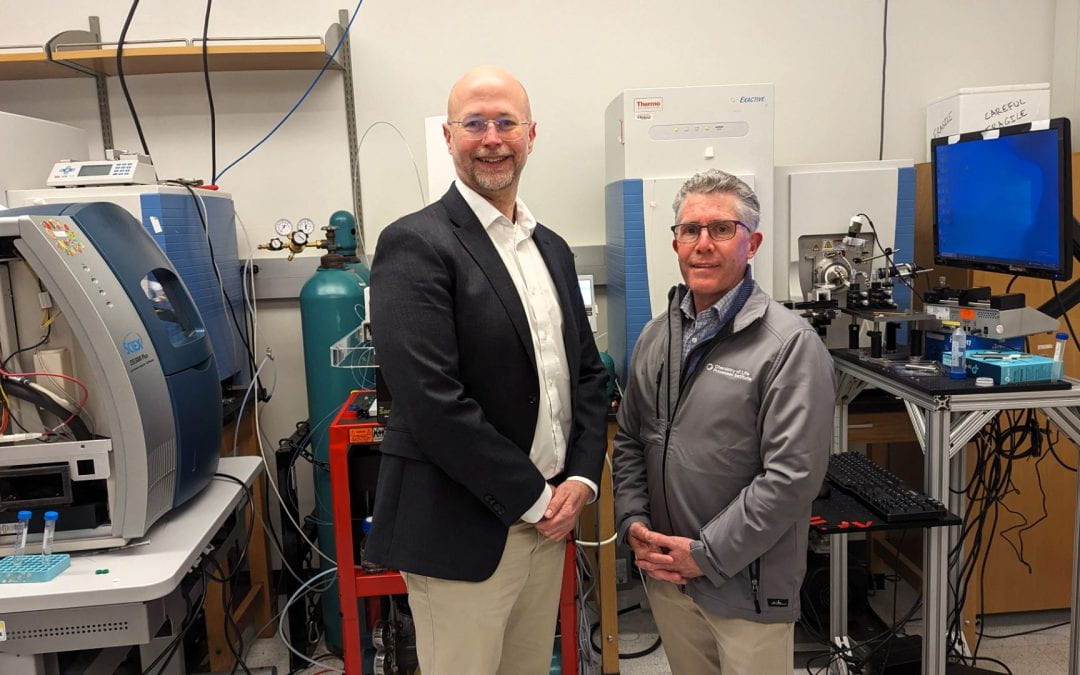As is the case with many other diseases, a protein is thought to be a key driver of Parkinson’s disease (PD). Thanks to a two-year $700,000 grant from The Michael J. Fox Foundation for Parkinson’s Research (MJFF), researchers in Northwestern’s Chemistry of Life Processes Institute (CLP) will work closely with other grantees to accurately detect, characterize and quantify the post-translational modifications of alpha-synuclein, a protein that has been identified as the main driver of PD.
“There’s a well-established history in the field that has shown diverse types of chemical modifications to alpha-synuclein exist, but researchers have applied different technologies and approaches to understanding the significance of those modifications,” says Steven Patrie, research associate professor and principal investigator of the two-year $700K grant. “The Michael J. Fox Foundation had decided to put a stake in the ground by asking the question, ‘How do modifications on alpha-synuclein change with regards to disease processes and what defining technologies will help to track these types of modifications quantitatively?’”
State-of-the-Art Expertise and Technology
The work will be performed in close collaboration with CLP’s Proteomics Center for Excellence (PCE) under the direction of Neil L. Kelleher, the Walter and Mary Elizabeth Glass Professor of Chemistry, Molecular Biosciences, and Medicine. The PCE will provide the state-of-the-art mass spectrometry resources and experienced staff needed to fulfill the award’s ambitious goals. PCE scientists will apply top-down proteomics (a method of analyzing intact proteins using highly sophisticated mass spectrometry technology) on PD patient samples to determine how modification of alpha-synuclein varies in people with and without PD. These modifications to the protein can change its structure and functional activity in the brain. The PCE excels in characterizing intact forms of proteoforms, a term for all the different molecular forms of a single protein that connect genes to disease.
“MJFF takes pride in being the foremost supporter of Parkinson’s disease research,” said Andrew Koemeter-Cox, PhD, Senior Associate Director of Research Programs, MJFF. “We look forward to the outcomes of Northwestern’s work in this collaborative effort in effectively identifying, describing and measuring the post-translational alterations of alpha-synuclein in PD.”
Better-Informed Disease Detection
“You have to know thy enemy,” says Kelleher, director of CLP. “You have to know how the proteoform landscape changes throughout the disease. If you know that, you can have better-informed drug development and disease detection.”
Despite their pivotal role, 99.9% of the body’s proteoforms remain undiscovered. This lack of information about proteoforms limits progress in detecting and treating diseases like PD. PCE is uniquely equipped to close this gap by detecting and measuring “unknown” proteoforms with speed and accuracy.
Together with other grantees, Northwestern will help establish a common framework for the different technologies and procedures that will be employed in this initiative, says Patrie. Using the same types of samples and similar processing methods will help strengthen correlations in data and understanding of biology of the disease.
“Most proteomics technologies can detect just a single protein modification at a time,” says Patrie. “With the top-down method for analyzing proteins we can holistically assess how many different types of chemical modifications to a protein molecule are present concurrently at a given time point. This will give us a sense of crosstalk between these types of modifications and how they work together to modify the activity of synuclein to affect the behavior of neurons. We will assess how these changes in synuclein protein structure in brain cells are related to different aspects of PD’s progression. These deep chemical insights are critical to understanding the biology of alpha-synuclein in neurodegenerative disease and can lead to the identification of more precise targets for therapeutic intervention.”
The top-down approach will allow researchers to observe unusual changes in PD samples’ mass and infer the types of biology driving those changes by comparing the measurements against a database of mass observations of other proteoform modifications.
“This work goes to the core of the CLP mission to uncover the mechanisms behind neurodegenerative disease through protein-informed approaches,” says Kelleher. “It’s a microcosm of why we need to sequence the entire human proteome. If we can do this for all human proteins, we could turn the tide on disease for everyone’s benefit.”
by Lisa La Vallee
Main image: Grant collaborators Steven Patrie and Neil Kelleher.
